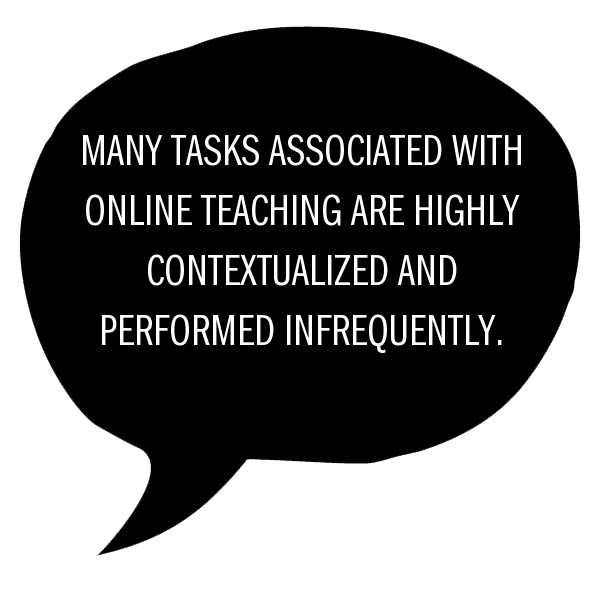-
ADDIE started the topic I Heard it through the Grapevine… They’re Forgetting! (Issue 1) in the forum Ask ADDIE 9 years, 1 month ago
[b]I Heard it through the Grapevine… They’re Forgetting! (Issue 1)[/b]
Dear ADDIE:
We provide our faculty with an array of training options, from full “programs” to become an online instructor, developer or peer reviewer, to short courses which include topics like using YouTube effectively, creating presentations in Google Slides and using Jing. Faculty seem to love our educational opportunities and get a lot out of them, but recently I’m hearing through the grapevine that a number of faculty aren’t retaining the “how to” skills. Unfortunately, they don’t want to admit this to us so that we can help! What can we do to prevent this problem in the future, and how can we help our faculty refresh their skills without losing face?Signed,
Focused on Faculty Not Forgetting[hr]
Dear Focused:
Thanks for raising an important question!
First, a little digression. You’ve hinted at a crucial principle for those of us engaged in preparing online faculty to be successful: evaluating the effectiveness of our efforts. Of course, we can (and should!) collect data formally as part of an evaluation plan (e.g., post-training survey, post-teaching interviews, etc.). However, you’ve highlighted the ubiquitous “grapevine,” and this kind of informal, anecdotal feedback is not to be overlooked! Quite often issues emerge more quickly through our relationships than through our formal channels, and attending to such themes keeps our work relevant and responsive. Obviously, we must not overreact, being careful to validate and vet such “grapevine” intel before determining an appropriate course of action. We are choosing to believe that you have concluded that the skills retention problem you’ve mentioned is indeed a valid issue.
Now, to the two-part question at hand. How do we help faculty retain the skills they’ve learned, and how can we support them in refreshing skills without embarrassment?
Many tasks associated with online teaching are highly contextualized, and some of these, especially those of a technical nature, are performed somewhat infrequently (e.g., once per semester). Several concrete suggestions come to mind for supporting the performance of such tasks in a just-in-time manner:
[b]Provide job aids.[/b] Some highly contextualized tasks just need some light support and a bit of reminding to trigger the previously developed procedural knowledge. Consider physical cards suitable for pinning up in one’s workspace. One digital analog might be send via email (or alternative messaging system used in your organization) a reminder of common semester start-up (or wrap-up) tasks.

[b]Design online “micro” content.[/b] Certain tasks might need a bit more support. Break down how-to content to a sensible (practical) level of granularity and, perhaps, make it accessible easily (publicly) online. Centralizing one authoritative source for such content online allows you to make any necessary updates or improvements (e.g., due to a new software version).The more granular the content, the higher the level of reusability. Contextualization can come in a workshop or online training course. Job aids (above) can include a link to the online micro content. Making these online resources public removes yet another potential hurdle (i.e., authentication) and opens up the discoverability of the resources through a common web search.
[b]Schedule “drop-in” sessions.[/b] Consider offering opportunities for faculty to come to a convenient location to get help with performing seasonal tasks. This might be in an “open lab” setting, or it might be a bring-your-own-device (BYOD) coffee break or lunch session within a particular academic department. In such a setting, there is no stigma for receiving help. It is the expectation.
[b]Cultivate a culture of collaboration.[/b] Admittedly, this is the most challenging of these recommendations and the one squarely not in the control of the instructional designer/faculty developer. However, fostering a culture of interdependence, openness, sharing, and collaboration among faculty means that an instructor who is “stuck” on a task might be quicker to reach out to a knowledgeable colleague than a culture in which every one is on their own and “forgetting” is embarrassing.You might find one, more, or all of the above suggestions useful. Certainly, they can all be deployed in one integrated whole as a strategy for supporting your online faculty if you wish.
Hoping that helps! Please report back when you can.
If you are reading this column and have additional ideas to share on this topic, please feel free to respond with your comments.
Best wishes for more memorable work!